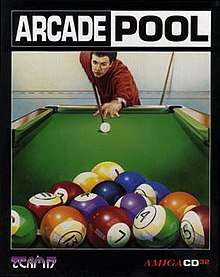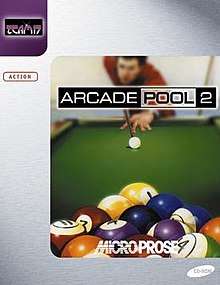Arcade Pool
Arcade Pool is a pool simulation game developed and published in 1994 by Team17, initially for the Amiga home computer system. The game was later ported to the PC, and a special CD32 release soon followed.
| Arcade Pool | |
|---|---|
 | |
| Developer(s) | Team17 |
| Publisher(s) | Team17 |
| Designer(s) | Mario Savoia |
| Composer(s) | Allister Brimble |
| Platform(s) | Amiga, Amiga CD32, MS-DOS |
| Release | 1994 (snooker version, 1995) |
| Genre(s) | Sports simulation – pool |
| Mode(s) | Single-player, multiplayer |
The game is a top-down pool simulator. Although simple, the physics are surprisingly accurate. The game featured many British and American variations of pool as well as two variations of ball set (standard UK red and yellow, and standard US circles and stripes).
Computer-controlled players are named after members of Team17 Staff (with Creative Director Martyn Brown being the most difficult computer-controlled player). The computer-controlled players with the lowest difficulty are all named after staff of Future Publishing-owned Amiga gaming magazine Amiga Power, adding more fuel to the fierce rivalry between the two companies.
A particular point of humour in the game stems from an Illegal Move message that appears, stating that you have "pocketed your opponent's ball(s)". This, of course, refers to pocketing balls which do not belong to you.
Sequel
| Arcade Pool 2 | |
|---|---|
 | |
| Developer(s) | Team17 |
| Publisher(s) | MicroProse |
| Designer(s) | Mario Savoia |
| Composer(s) | Allister Brimble |
| Platform(s) | PC |
| Release | 1999 |
| Genre(s) | Sports simulation – pool |
| Mode(s) | Single player, two player (either hotseat or via Internet IP play/LAN) |
A sequel, Arcade Pool 2, was published in 1999 by MicroProse. It was essentially an updated and overhauled version of the original, albeit with Internet play and additional play modes.